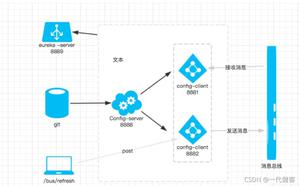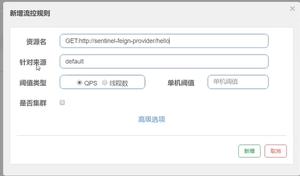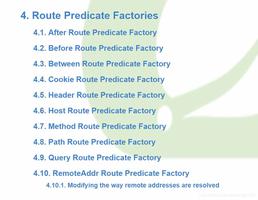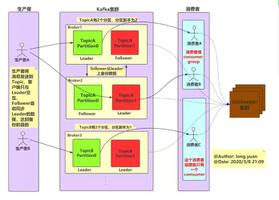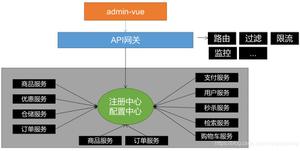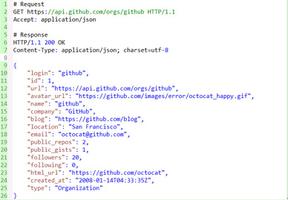SpringCloud之RefreshScope源码解读

- AbstractBeanFactory#doGetBean创建Bean实例
Copy
protected <T> T doGetBean(...){ final RootBeanDefinition mbd = ... if (mbd.isSingleton()) { ... } elseif (mbd.isPrototype()) ... } else { String scopeName = mbd.getScope(); final Scope scope = this.scopes.get(scopeName); Object scopedInstance = scope.get(beanName, new ObjectFactory<Object>() {...}); ... } ... }
- Singleton和Prototype是硬编码的,并不是Scope子类。 Scope实际上是自定义扩展的接口
- Scope Bean实例交由Scope自己创建,例如SessionScope是从Session中获取实例的,ThreadScope是从ThreadLocal中获取的,而RefreshScope是在内建缓存中获取的
- @Scope 对象的实例化
- @RefreshScope 是scopeName="refresh"的 @Scope
Copy
@Target({ ElementType.TYPE, ElementType.METHOD }) @Retention(RetentionPolicy.RUNTIME) @Scope("refresh") @Documentedpublic@interface RefreshScope { /** * @see Scope#proxyMode() * @return proxy mode */ScopedProxyMode proxyMode()default ScopedProxyMode.TARGET_CLASS; }
- @Scope 的注册 AnnotatedBeanDefinitionReader#registerBean
Copy
publicvoidregisterBean(...){ ... ScopeMetadata scopeMetadata = this.scopeMetadataResolver.resolveScopeMetadata(abd); abd.setScope(scopeMetadata.getScopeName()); ... definitionHolder = AnnotationConfigUtils.applyScopedProxyMode(scopeMetadata, definitionHolder, this.registry); }
- 读取@Scope元数据, AnnotationScopeMetadataResolver#resolveScopeMetadata
Copy
public ScopeMetadata resolveScopeMetadata(BeanDefinition definition){ AnnotationAttributes attributes = AnnotationConfigUtils.attributesFor( annDef.getMetadata(), Scope.class); if (attributes != null) { metadata.setScopeName(attributes.getString("value")); ScopedProxyMode proxyMode = attributes.getEnum("proxyMode"); if (proxyMode == null || proxyMode == ScopedProxyMode.DEFAULT) { proxyMode = this.defaultProxyMode; } metadata.setScopedProxyMode(proxyMode); } }
Scope实例对象通过ScopedProxyFactoryBean创建,其中通过AOP使其实现ScopedObject接口,这里不再展开
@RefreshScope 源码解读#
RefreshScope注册#
RefreshAutoConfiguration#RefreshScopeConfiguration
Copy
@Component@ConditionalOnMissingBean(RefreshScope.class) protectedstaticclassRefreshScopeConfigurationimplementsBeanDefinitionRegistryPostProcessor{ ... registry.registerBeanDefinition("refreshScope", BeanDefinitionBuilder.genericBeanDefinition(RefreshScope.class) .setRole(BeanDefinition.ROLE_INFRASTRUCTURE) .getBeanDefinition()); ... }
- RefreshScope extends GenericScope, 大部分逻辑在 GenericScope 中
- GenericScope#postProcessBeanFactory 中向AbstractBeanFactory注册自己
Copy
publicclassGenericScopeimplementsScope, BeanFactoryPostProcessor...{ @OverridepublicvoidpostProcessBeanFactory(ConfigurableListableBeanFactory beanFactory)throws BeansException { beanFactory.registerScope(this.name/*refresh*/, this/*RefreshScope*/); ... } }
RefreshScope 刷新过程#
- 入口在ContextRefresher#refresh
Copy
publicsynchronized Set<String> refresh(){ Set<String> keys = refreshEnvironment(); this.scope.refreshAll(); return keys; } publicsynchronized Set<String> refreshEnvironment(){ Map<String, Object> before = extract( this.context.getEnvironment().getPropertySources()); addConfigFilesToEnvironment(); Set<String> keys = changes(before, extract(this.context.getEnvironment().getPropertySources())).keySet(); this.context.publishEvent(new EnvironmentChangeEvent(this.context, keys)); return keys; }
- ①提取标准参数(SYSTEM,JNDI,SERVLET)之外所有参数变量
- ②把原来的Environment里的参数放到一个新建的Spring Context容器下重新加载,完事之后关闭新容器
- ③提起更新过的参数(排除标准参数)
- ④比较出变更项
- ⑤发布环境变更事件,接收:EnvironmentChangeListener/LoggingRebinder
- ⑥RefreshScope用新的环境参数重新生成Bean
- ⑦重新生成的过程很简单,清除refreshscope缓存幷销毁Bean,下次就会重新从BeanFactory获取一个新的实例(该实例使用新的配置)
- ⑧RefreshScope#refreshAll
Copy
publicvoidrefreshAll(){ <b>super.destroy();</b> this.context.publishEvent(new RefreshScopeRefreshedEvent()); }
- ⑨GenericScope#destroy
Copy
publicvoiddestroy(){ ... Collection<BeanLifecycleWrapper> wrappers = <b>this.cache.clear()</b>; for (BeanLifecycleWrapper wrapper : wrappers) { <b>wrapper.destroy();</b> } }
以上是 SpringCloud之RefreshScope源码解读 的全部内容, 来源链接: utcz.com/z/513379.html

